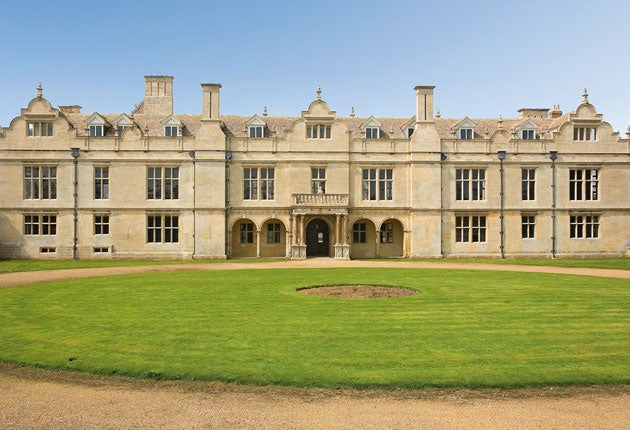English Heritage to sell off historic house at £5m loss
Falling property prices force the taxpayer to foot the bill for a multimillion-pound 'heritage deficit'

Your support helps us to tell the story
From reproductive rights to climate change to Big Tech, The Independent is on the ground when the story is developing. Whether it's investigating the financials of Elon Musk's pro-Trump PAC or producing our latest documentary, 'The A Word', which shines a light on the American women fighting for reproductive rights, we know how important it is to parse out the facts from the messaging.
At such a critical moment in US history, we need reporters on the ground. Your donation allows us to keep sending journalists to speak to both sides of the story.
The Independent is trusted by Americans across the entire political spectrum. And unlike many other quality news outlets, we choose not to lock Americans out of our reporting and analysis with paywalls. We believe quality journalism should be available to everyone, paid for by those who can afford it.
Your support makes all the difference.English Heritage is being effectively forced to pay people to take historic buildings off its hands. One of the country's most important Elizabethan and Jacobean buildings – which, so far, has cost the public body £7.5m – is set to be sold for about half of its £4.5m asking price, with any buyer likely to receive yet more money from English Heritage to help with a vast amount of repair works.
The situation highlights the devastating impact of the global recession on English Heritage and the serious knock-on impact on some of the nation's most important buildings. English Heritage acquired Apethorpe Hall in Northamptonshire from its previous owner for £3.5m in 2004 under a compulsory purchase order. In an attempt to preserve the building's rich 500-year history after two decades of decay and neglect it has so far spent £4m restoring the building.
Experts are even suggesting that English Heritage relax some of its strict rules on restoration in order to allow cash-strapped owners to repair their homes more cheaply and stop them deteriorating to such an extent that they become worthless.
Once a favourite residence of monarchs, Apethorpe is thought to have been the scene of a royal sex scandal involving James I, after restoration work revealed a secret doorway from the king's bedchamber to that of favoured courtier George Villiers, the Duke of Buckingham. The building went on sale in May. Bidding has now closed, with the purchase to be finalised in the next few weeks.
The successful buyer is likely to receive a substantial grant to contribute to the works that are still needed. English Heritage grants given to Grade I and II listed buildings, which range from a few thousand to a few hundred thousand, have increased tenfold in the past 10 years, from £5m in 1998 to £58m in 2008.
"The guide price indicator was around £4m, but we won't be achieving that," said David Tomback, development economics director at English Heritage. "This one has a huge conservation deficit. We've spent £4m on it, and whoever buys it will have to spend £4m on emergency repairs, and probably another £12m will need to be spent on it."
But Mark Wallace, campaign director of the TaxPayers' Alliance, said: "It is unforgivable that taxpayers are losing so much money on Apethorpe Hall. These funds are meant to be used carefully. In the case of Apethorpe, money has clearly been splashed unwisely and the sale is set to produce a massive loss. The saga has been a disaster throughout."
Experts warned yesterday that the recession has sparked a widespread "heritage deficit", with plummeting prices rendering listed properties less than worthless as owners struggle to meet huge maintenance costs.
"There are more occasions where buildings are being left to rot," said Adrian Stenning, chairman of the Conservation Forum for the Royal Institute of Chartered Surveyors (RICS). "Listed buildings are so expensive to do up, and there are restrictions on changing them, so people don't buy them. They reach a point where you can't even sell them. This will be happening more and more when property prices are at the bottom."
This effect has been felt nationwide. In July, National Trust Scotland (NTS) announced that it was closing four important properties after a cost-cutting review deemed them to expensive to keep. This followed a year that saw NTS cut 65 jobs, after reporting a deficit of £800,000 last year.
Join our commenting forum
Join thought-provoking conversations, follow other Independent readers and see their replies
Comments